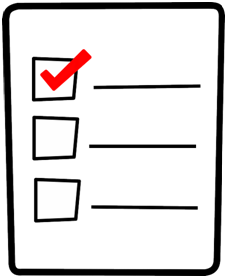1. Trade too big. “Too big”, in this case, means trading too large relative to your account size. (If you have my book, Chapter 9 includes an extensive discussion on this topic, with illustrations of what can go wrong.) Even a profitable trading system can be torpedoed by trading too big. Consider this: even with a high probability trading system, you will, at some point, have four or five losing trades in a row. If your losses are 10% of your account, you just bled half your account equity and now have to double your money, make a 100% gain, to get back to breakeven. In addition to the return needed, you also now face the psychological struggle of extreme P&L swings. In my work with Waverly Advisors, we typically advise clients to limit the risk on any position to 1%-3% of your account equity. Trading with too much leverage and taking losses that are too large is one of the most common mistakes newer traders make. It’s hard to say what the “worst” mistake in trading is, but this one has to be near the top of the list. (Incidentally, most of the egregious marketing targeted to developing traders (“Turn $3,000 into $1,000,000 in one year…”) requires you make this mistake. The only way to make exceptional gains is to trade so big that your trading account is basically a lottery ticket. Have a few hundred traders doing this, and someone will probably win the lottery, providing marketing material for years to come. Buyer beware.)
 2. Use a methodology that does not work. No matter how diligently you work to limit your risk and discipline your trading, if you are doing something that simply does not have an edge in the market, you won’t make money in the long haul. Every trade has costs. There are obvious costs like commissions, fees, data service fees, research, paying the spread, but others might not be so obvious to some investors. (Have you considered financing costs? If your money wasn’t in your trading account, it could be earning interest somewhere. In today’s environment, “risk free” interest might be negligible, but over the course of a lifetime it is not insignificant.) If you don’t have some edge over the market, meaning that your long trades are more likely to go up and your short trades are more likely to go down, you will, at best, slowly bleed money. There are many ways to find an edge in the market, but the bad news is that most things most people think work, simply do not.
2. Use a methodology that does not work. No matter how diligently you work to limit your risk and discipline your trading, if you are doing something that simply does not have an edge in the market, you won’t make money in the long haul. Every trade has costs. There are obvious costs like commissions, fees, data service fees, research, paying the spread, but others might not be so obvious to some investors. (Have you considered financing costs? If your money wasn’t in your trading account, it could be earning interest somewhere. In today’s environment, “risk free” interest might be negligible, but over the course of a lifetime it is not insignificant.) If you don’t have some edge over the market, meaning that your long trades are more likely to go up and your short trades are more likely to go down, you will, at best, slowly bleed money. There are many ways to find an edge in the market, but the bad news is that most things most people think work, simply do not.
3. Change methodologies constantly. The process of developing a successful trading program does require some course correction. Appropriate tools for your market, timeframe, personality, skill level, risk tolerance, investment mandate, etc. must be used, and these factors may change a bit over time. Rigidly clinging to something that doesn’t work is a plan for failure, but so is frantically trying something new every week. If you are shifting from candlestick patterns to moving averages to trading in play earnings stocks to spread trades to selling option spreads, you probably are not setting yourself up for success. You need to monitor the performance of your method, but also your behavior and your compliance with the system. This takes time and a disciplined approach to record keeping and evaluation. Obviously, points one, two, and three are interconnected.
4. Misunderstanding how trading works. Trading is a game of probabilities. No matter what methodology you are using—fundamental, macro or technical; highly quantitative, intuitive, seat of pants, or blend; long term, short term, daytrading—at the end of the day, the expected value of your trades has to be positive, or you aren’t going to make money. There is no free lunch. Though you may get lucky (or unlucky) on a set of trades, over a large set of trades, the Law of Large Numbers rules with an iron fist. There is no way to “game” the system. You can’t take small trades with tiny risk, you can’t sell time premium, you can’t find some magic technical pattern. Yes, all of these things can be part of a working methodology, but that methodology has to have a positive expectancy. To put it simply, it has to work. (Now, you can see that points 1-4 are really basically the same point!)
5. Be overconfident. Markets punish hubris and overconfidence with remarkable consistency. (Victor Niederhoffer has written poignantly on this subject.) Overconfidence can hit in many ways. Industry statistics show that most small trading accounts lose money, so, you have to ask yourself, why will you be different? (Hint: answers like “I have a passion for markets. I was successful in this business or this sport. I’m a driven, detail-oriented person,” are probably not strong enough answers. Dig deep. Why will you succeed where so many others have tried and failed?) Overconfidence can creep in in other ways too. After a long string of winning trades, some traders are tempted to get more aggressive and increase their risk… and now they are trading too big, so bad things happen. There’s a sweet spot here—you have to have a degree of confidence, you can’t be afraid, but you have to stay humble. If you don’t, the market will make you humble, one way or another.
Obviously, this is a cautionary list. No one wants to read a formula for failure, but these are some common pitfalls to avoid. Not doing these things does not guarantee success, but making these errors will virtually assure failure. I’ve seen traders struggle with these for years, friends and traders I’ve trained and worked with, and, at some point in my career, I committed every one of these mistakes—sometimes more than once. Yes, we learn from mistakes, but it’s even better if you can learn from someone else’s mistakes and not have to repeat them yourself. I hope these ideas help some of my readers, and at least point you in the right direction toward success.

Pingback: Friday links: catching a myth | Abnormal Returns
Thank You !
On a Lighter note; If two Wrongs don’t make a Right, try three lefts to make a Right & No Matter Whatever Happens, You will be Alright…. 🙂
🙂
Pingback: ??? 5 ?????? ????????: ?1 T???????? ??-???????? -
Pingback: ??? 5 ?????? ????????: ?2 ????????? ??????? -
Pingback: ??? 5 ?????? ????????: ?3 ?????? ??????? ??? ???????? -
Pingback: ??? 5 ?????? ????????: ?4 ??????? ? ????????? -
Pingback: ??? 5 ?????? ????????: ?5 ??????????????? -
“Incidentally, most of the egregious marketing targeted to developing traders (“Turn $3,000 into $1,000,000 in one year…”) requires you make this mistake.”
I’m not sure a lot of new traders understand that the survivors live off of compounding from large accounts, not necessarily off the proceeds of their trades day to day. Without adequate capitalization, they would have to take too much risk on a small account to earn a living, and even the living they did eek out (before they inevitably busted) would be extremely volitile.
It’s a question of reasonable % returns from accounts… and too many people think they are going to live off earnings from small accounts… just creates far too much internal stress and tension that it’s not possible.